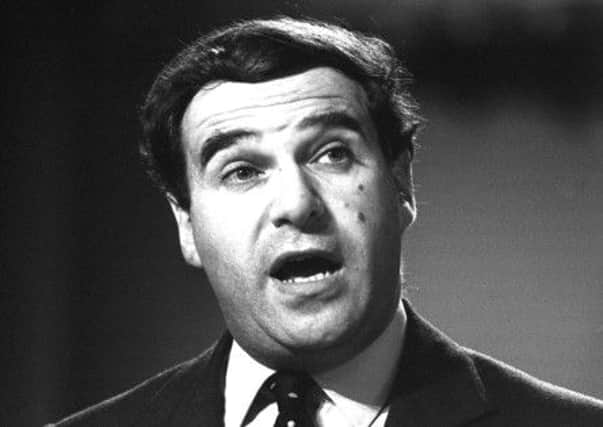Obituary: Sir Leon Brittan, politician


Lord Brittan, politician and barrister.
Born: 25 September, 1939, in London.
Died: 21 January, 2015, in London, aged 75.
SIR Leon Brittan, Baron Brittan of Spennithorne, who has died aged 75 after suffering from cancer, was a former barrister, Conservative MP, Home Secretary under Margaret Thatcher and latterly a key British representative in a Europe still trying to create its own identity by blending its disparate parts. His roles within the European Commission included vice-president. The media reported that he died “after a battle with cancer” but he did not like the word “battle”. Cancer, he said, is not so far being fought on a level battlefield, though he hoped one day it would be, and that science and medicine would prevail.
Even to those who don’t follow politics on a daily basis, Leon Brittan was a familiar presence on our TV screens, a usually cheery face which belied his stubborn desire to make a difference in UK national politics.
Advertisement
Hide AdAdvertisement
Hide AdThe son of Lithuanian Jewish immigrants, he became very much a typical English public schoolboy, educated at the famous Haberdashers’ School in Hertfordshire and rising to become president of the University of Cambridge Union Society.
Having been born within three weeks of the start of the Second World War, he faced antisemitism in the early years of life in the land where his parents had sought refuge. He overcame it and the atrocities of the Holocaust, too slowly revealed, helped Britons and the rest of the world understand what the Jewish people had suffered. Leon Brittan found acceptance in the land that was now his home.
During the 1980s, as Home Secretary, he became Margaret Thatcher’s “right-hand man” in a way, not least during the 1984-85 miners’ strike. When he called the flying pickets supporting the miners “thugs”, needless to say it did not go down too well among the miners trying to feed their families.
It went down fine with his boss though. When she named him Home Secretary, Brittan was the youngest to have held the role since Churchill – although neither of them was that young by modern standards.
Brittan was knighted in 1989 by the Queen and later took the title Baron Brittan of Spennithorne in the House of Lords. The title did not make him a favourite with British miners. Nor did it spare him from a spate of allegations and negative news reports which assaulted him in recent years. When he was Home Secretary in 1984, he was handed a 40-page dossier by Geoffrey Dickens MP which allegedly documented acts of paedophilia carried out by MPS of the time. The document disappeared and Leon Brittan insisted he never seen it.
In June last year, Lord Brittan was interviewed by police in connection with the alleged rape of a 19-year-old student – before he was an MP. He denied the allegation, saying it was “wholly without foundation”.
Leon Brittan was born on 25 September, 1939, three weeks after Britain declared war on Germany. His parents’ homeland, Lithuania, would soon be occupied by Soviet forces and later taken over by the Nazis.
Leon’s parents had seen it coming. Had they not fled to England before the war, his life would no doubt have been totally different, indeed he may have ended up in a concentration camp, the chances of surviving minimal. He always acknowledged that with gratitude. According to his friends at Cambridge very little arm-twisting was involved to encourage him to go into politics. He was earmarked as potential Tory MP for North Kensington.
Advertisement
Hide AdAdvertisement
Hide AdHe failed in that attempt but his party found a safe haven for him, Cleveland and Whitby, a place he had never heard of, and whose residents had not heard of him. He looked it up on an AA road map and would win the respect of the locals from 1974 to 1993.
He later went on to represent Richmond in Yorkshire.
He became Minister of the State for the Home Office in 1979, then Chief Secretary to the Treasury, at the time the youngest member of the cabinet. It was at that time that he first put his cards down. Looking slowly around the oblong cabinet table, he told his cabinet colleagues: “Social security, health and education are going to have to be cut. Whether you, or I, like it or not.”
In September 1985, Brittan was became Secretary of State for Trade and Industry. Mrs Thatcher had felt that he was not “the great communicator” she needed to back her up.
He had also been blamed for suppressing a BBC TV programme about the Northern Ireland troubles, critical of Mrs Thatcher and himself.
In 1989 he resigned as an MP to become European Commissioner for Competition, a post he held until 1993. Two years later he became European Commissioner for Trade and European Commissioner for External Affairs, and served as a vice-president of the European Commission.
Lord Brittan’s wife Diana (née Clemetson), was named a Dame of the British Empire in 2004 for her public service and charity.
He is survived by his wife,his two stepdaughters Katharine and Victoria, step-grandchildren and his brother Samuel.
PHIL DAVISON